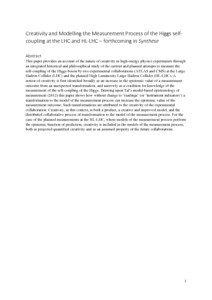Ritson, Sophie
(2021)
Creativity and Modelling the Measurement Process of the Higgs self-coupling at the LHC and HL-LHC.
[Preprint]
![[img]](https://philsci-archive.pitt.edu/19326/1.hassmallThumbnailVersion/Creativity%20and%20Modelling%20the%20Measurement%20Process%20of%20the%20Higgs%20self-coupling.pdf)  Preview |
|
Text
Creativity and Modelling the Measurement Process of the Higgs self-coupling.pdf
Download (467kB)
| Preview
|
Abstract
This paper provides an account of the nature of creativity in high-energy physics experiments through an integrated historical and philosophical study of the current and planned attempts to measure the self-coupling of the Higgs boson by two experimental collaborations (ATLAS and CMS) at the Large Hadron Collider (LHC) and the planned High Luminosity Large Hadron Collider (HL-LHC). A notion of creativity is first identified broadly as an increase in the epistemic value of a measurement outcome from an unexpected transformation, and narrowly as a condition for knowledge of the measurement of the self-coupling of the Higgs. Drawing upon Tal’s model-based epistemology of measurement (2012) this paper shows how without change to ‘readings’ (or ‘instrument indicators’) a transformation to the model of the measurement process can increase the epistemic value of the measurement outcome. Such transformations are attributed to the creativity of the experimental collaboration. Creativity, in this context, is both a product, a creative and improved model, and the
distributed collaborative process of transformation to the model of the measurement process. For the case of the planned measurements at the HL-LHC, where models of
the measurement process perform the epistemic function of prediction, creativity is included in the models of the measurement process, both as projected quantified
creativity and as an assumed property of the future collaborations.
Available Versions of this Item
-
Creativity and Modelling the Measurement Process of the Higgs self-coupling at the LHC and HL-LHC. (deposited 17 Jul 2021 03:45)
[Currently Displayed]
Monthly Views for the past 3 years
Monthly Downloads for the past 3 years
Plum Analytics
Actions (login required)
 |
View Item |




